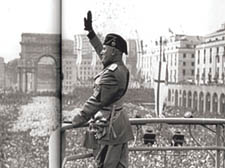|
|
 |
| |

?Benito Mussolini (1883-1945) |
Politics, power and the making of modern Italy
IN The Force of Destiny, a title taken from Verdi’s opera La Forza del Destino, Christopher Duggan concentrates overwhelmingly on politics, with war as its extension.
This leaves little room for other subjects, including everyday life, leisure, culture and even religion, other than in their political aspects. Women, including that quintessential Italian figure La Mamma, and children are almost completely absent. In many ways therefore an old-fashioned work, the book cannot claim to be a complete history of modern Italy. If, however, you are looking for a clearly written narrative political history, especially of the 19th century, this is it.
Duggan is at his best on the years before the Risorgimento, with Napoleon’s kingdom of Italy bringing short-term, imposed unity to the heterogeneous jigsaw of small independent states that had existed before the French Revolution. He is excellent on the Romantic political and literary vision of Italy, and on the main architects of the nation, Mazzini, Cavour and Garibaldi, each with his own very different approach.
From the first foundations of the state there were strategic faults, with unresolved conflicts between North and South, and between Catholic and Liberal.
The years after 1860 saw the equivalent of a civil war, with the South subjected to a brutal Northern army of occupation. Eight million Italians voted with their feet and emigrated.
The Catholic Church remained, even after its final loss of temporal power in 1870, a state within a state. In addition, there was perpetual competition and tension between different regions, cities, classes and interest groups throughout the country.
Itself often corrupt, the government found it difficult to impose its will or to limit corruption and organised crime. This in turn made government finance chronically weak and the efficient running of the state almost impossible. Its armed forces suffered a series of ignominious defeats. Few Italians believed in their rulers.
Even Mussolini, in power from 1922 to 1943, never dominated Italy as Hitler did Germany. His control of the armed forces, big business and the Church remained proscribed.
To unify the nation and overcome sectional divisions, he proclaimed that war was desirable in itself. He was certainly not the first Italian politician to think so, as many of his attitudes had been expressed by earlier prime ministers, including Crispi and Salandra.
Despite Mussolini’s belligerence and boasting, the Italian armed forces performed ignominiously in the Second World War. During the war not a single shell from its fleet of battleships hit an enemy ship. Italy’s defeat cannot, however, be put down simply to national cowardice. In the First World War, the exception that proved the rule, the Italian army had fought resolutely, winning against Austria at the cost of 600,000 dead.
MARTIN SHEPPARD
|
 |
|
 |
 |
|
 |
|


